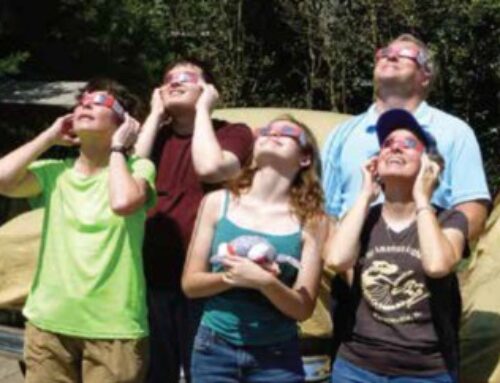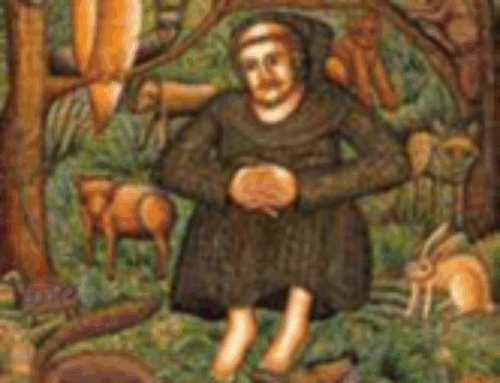(This article originally appeared in the Summer/Fall 2019 issue of the TAU-USA.)
 By Kelly Moltzen, OFS
By Kelly Moltzen, OFS
After finishing high school, becoming an “alumna” of Capuchin Youth & Family Ministries (CYFM), and going away to college, I gradually began to yearn more and more for the charism of the Franciscan community I had through CYFM but didn’t feel through my college’s Catholic Campus Ministry. I found moreof a sense of this charism through InterVarsity Christian Fellowship, an ecumenical Christian fellowship organization on campus.
While there were a few Catholics who attended both Catholic Campus Ministry and InterVarsity, there were also many Protestants who helped contribute to the community I felt deeply through InterVarsity. It was an opportunity to meet and fellowship with other Christians who genuinely sought to follow Jesus. We did service projects together, worshipped together, and did Bible study together.
One particularly impactful thing we did was read The Irresistible Revolution by Shane Claiborne. That book inspired me to want to live in intentional community once I moved to New York City. I settled into the Bronx with several non-Catholics who introduced me to the work of Dorothy Day and her Catholic Worker movement, Fr. Richard Rohr, and others who like Shane Claiborne were associated with the Red-Letter Christian movement (people who are working to take the words of Jesus seriously, looking particularly at Jesus’ words, which in many Bibles are written in red letters to distinguish them from the rest of the text).
Members of InterVarsity and the Red-Letter Christians movement launched LoGOFF (Local, Green, Organic, Fair-trade, Slave-Free), created opportunities for faith-rooted organizing in New York City, and initiated efforts to address health disparities through organizing a Food, Faith & Health Disparities conference. For years, this has given me hope that we can better use our Eucharistic meal practices as the food to sustain work to make sure everyone is treated like a human being regardless of race, has access to affordable, nourishing food, and has a consciousness of the value of God-given food over hyper-processed foods with little nutritional value.
It’s been non-Catholic Franciscan-hearted Christians who have most often accompanied my path living in community in the Bronx, including participating in dinners that are more about shared fellowship, hopes, dreams and goals than they are about arguments or differences of opinion over church history and ecclesiastical splits. This all has given me life.
So when I discovered that the Franciscan family is ecumenical, as there are other Christians who value following in the footsteps of St. Francis and who have created orders within their denominations to follow him —and were united in mission for peace, justice and integrity of creation through the Joint Committee on Franciscan Unity and the Franciscan Action Network (FAN) — I was overjoyed. Building the Kingdom of Heaven together with Franciscan Ecumenical Interfaith Committee Joint Committee on Franciscan Unity 11 Christians of different denominations and even working through interfaith collaboration for the common good… imagine that! What could we not accomplish?
Sadly, I have often gotten the impression that many Catholics and OFS members seem to talk about following the path of Jesus and Francis as something exclusive to Catholics, instead of seeking to build the Kingdom of God in partner ship with Christians of other denominations and listening to the experiences that Protestants have to share with us.
Jesus’ words were meant for everybody, and there are many Christians who truly live them out. By acknowledging our shared values of baptism, vocation, charism, Christ-Centered spirituality, and prophetic voice, we can identify other Franciscans and Franciscan-hearted individuals with whom we can work to bring the kingdom of Heaven to Earth. Those who serve the marginalized, those who see others’ destinies tied with their own, those who recognize we are cocreators with God in this ever-expanding universe, who speak truth to power to authorities within hierarchies that are not serving God’s people, who commit their vocations to peace, justice and integrity of creation — these are our kin. They are Franciscan-hearted individuals doing what they can to bring Christ to the world.
Non-Catholics may in fact be models of living out Catholic Social Teaching without calling it that. To see Christ in the other and to listen to the calling from God to protect and restore human dignity beyond birth, across the entire span of life — that is Christian and Franciscan. To live as if we are interconnected with one another and all creation is Franciscan.
Christ, Francis, Clare, and the many other prophetic witnesses in our Church’s history meant us to follow them, not just to revere them or to remember them once a year. Our contemporary Dorothy Day, whose canonization is under consideration, said, “Don’t call me a saint. I don’t want to be dismissed that easily.”
So we must ask ourselves, what can we do to ensure the lessons these people taught us while on this earth are taken seriously by all followers of Christ?




Leave A Comment